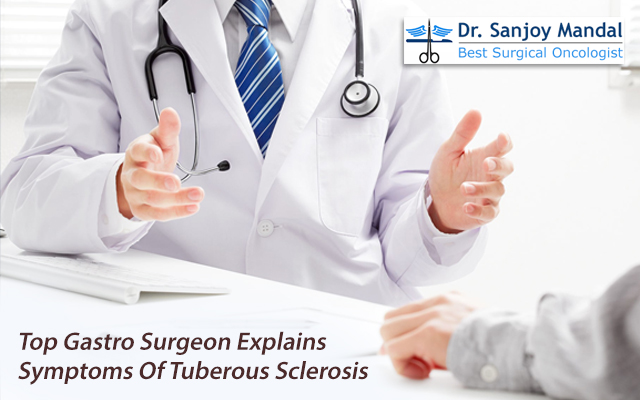Tuberous sclerosis is a rare genetic condition that results in noncancerous (benign) tumours – unanticipated overgrowths of normal tissue — in various places of the body, says Dr Sanjoy Mandal, a gastroenterologist surgeon in Kolkata. The signs and symptoms differ greatly depending on where the growths appear and how badly a person is affected.
Tuberous sclerosis is frequently discovered in children. Some people with tuberous sclerosis have such modest symptoms that the ailment is not detected until they are adults and others have severe disabilities.
Although there is no cure for tuberous sclerosis and the disorder’s progress or severity cannot be anticipated, treatments are available that can manage the symptoms.
Symptoms
Tuberous sclerosis symptoms are caused by noncancerous tumours (benign) in many body sections, most commonly the brain, eyes, GI tract, kidneys, heart, lungs and skin. However, any portion of the body can be affected. Depending on the size and location of the overgrowth, symptoms might range from moderate to severe, says the top gastro surgeon in Kolkata.
Although the signs and symptoms of tuberous sclerosis differ from person to person, they may include:
Skin discolorations
The majority of persons with tuberous sclerosis have light-colored patches of skin, or they may develop little areas of thicker, smooth skin or reddish bumps around the nails. Acne-like facial growths that appear in childhood are also prevalent.
Seizures
Seizures, which might be the first symptom of tuberous sclerosis, may be related to brain growth. An infantile spasm is a common form of seizure that manifests as recurrent spasms of the head and legs.
Cognitive impairments
Tuberous sclerosis can cause developmental delays, intellectual impairment and learning problems. Autism spectrum disorder and attention-deficit/hyperactivity disorder (ADHD) are examples of mental health diseases that might develop because of tuberous sclerosis.
Behavioral issues
Common behavioral disorders include hyperactivity, self-injury, violence and social and emotional adjustment concerns can be indications of tuberous sclerosis, says the best gastroenterology doctor in Kolkata.
Kidney issues
Most persons with tuberous sclerosis get noncancerous growths on their kidneys and the number of growths may increase as they age.
Heart problems
If present, cardiac growth is typically biggest at birth and diminishes as the child grows older.
Lung issues
Lung growths can cause coughing or shortness of breath, especially during vigorous exertion or exercise. Women are more likely than men to get these benign lung tumours.
Anomalies of the eyes
Growths can appear as white patches on the back of the eye’s light-sensitive tissue (retina). These noncancerous growths do not necessarily obstruct eyesight.
When should you see a doctor?
Tuberous sclerosis’s initial indications and symptoms can appear throughout childhood or even years later in adults. Contact your doctor if you are worried about development or see any of the signs or symptoms of tuberous sclerosis indicated above, says the gastroenterologist surgeon in Kolkata.
